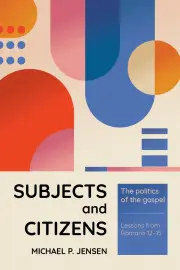Helpful to read a book on how Christians should approach politics
In this year of elections and continued political turbulence, it is helpful to read a book on how Christians should approach politics.
Jensen distinguishes between Politics 1.0, that is politics as most would understand it, and Politics 2.0, that is the new politics of the Kingdom of God. Christians cannot avoid politics, because the belief that ‘Jesus is Lord’ is itself a highly political statement. This truth rejects Caesar as Lord, and it rejects all other so-called Lords ever since. To help us think Biblically about politics, Jensen goes back to what we can learn from Romans chapters 12-15, as ‘Scripture is the foundational text of Politics 2.0’ (p.52). The church as God’s kingdom on earth now, and forerunner of the future eternal kingdom, has the responsibility to show what having Jesus as Lord looks like. Much of this comes down to the micro-politics of interpersonal relations within the church as we are transformed by the renewal of our minds (Rom.12.1-2). This will be expressed in love (Rom.13.8), selflessness (Rom.14.1-15.6), and hospitality (Rom.15.7). The best way for Christians and the church to do politics is to model what this counter-cultural Jesus-serving community looks like, and to preach Jesus as Lord to see people following Him – Politics 2.0, even as some Christians will be called to participate in Politics 1.0.
The centre of the book is the chapter on Romans 13.1-7. The State is ordained by God to restrain and punish evil, which Jensen interprets broadly, ‘because evil and injustice are widespread and take a lot of restraining’ (p.98). Jensen recognises that Christians may take different views on political questions where the Bible does not have a clear view. The Bible does not endorse any particular political system, although democracy can be seen as balancing the twin truths of human equality and corruptibility. Only anarchism is ruled out, as it does not recognise the God-given nature of authority. Even a bad government is better than no government, as then evil will not be restrained at all. Nazi Germany was wicked, but some aspects of that state still restrained evil, e.g. the normal criminal justice system. In the same vein, Jensen sees civil disobedience as a last resort. In a democracy like ours, there are many legitimate avenues to make our voices heard before going further.
Jensen closes his book with some terms of engagement for Christians and politics: critical, but not cynical; hopeful; loving our neighbours; the goodness of order and authority; concern for the poor; and making peace. All valuable precepts as we think through how we can best engage with politics Biblically. This is not a conventional politics book. There is no discussion of what different political parties stand for. But by going deeper into how the Bible says we should live together as God’s people, and the political implications of that, he helps us to better preach and live out that Jesus is Lord.
Stephen Ayre, Evangelicals Now
Jesus is Lord
In this year of elections and continued political turbulence, it is helpful to read a book on how Christians should approach politics. Jensen distinguishes between Politics 1.0, that is politics as most would understand it, and Politics 2.0, that is the new politics of the Kingdom of God. Christians cannot avoid politics, because the belief that “Jesus is Lord” is itself a highly political statement. This truth rejects Caesar as Lord, and it rejects all other so-called Lords ever since. To helps us think Biblically about politics, Jensen goes back to what we can learn from Romans chapters 12-15, as “Scripture is the foundational text of Politics 2.0” (p.52). The Church as God’s Kingdom on earth now and forerunner of the future eternal kingdom has the responsibility to show what having Jesus as Lord looks like. Much of this comes down to the micro-politics of interpersonal relations within the church as we are transformed by the renewal of our minds (Rom 12.1-2). This will be expressed in love (Rom 13.8), selflessness (Rom 14.1-15.6), and hospitality (Rom 15.7). The best way for Christians and the church can do politics is to model what this counter-cultural Jesus-serving community looks like, and to preach Jesus as Lord to see people following him – Politics 2.0 even as some Christians will be called to participate in Politics 1.0.
The centre of the book is the chapter on Romans 13.1-7. The state is ordained by God to restrain and punish evil, which Jensen interprets broadly, “because evil and injustice are widespread and take a lot of restraining” (p.98). Jensen recognises that Christians may take different views on political questions, where the Bible does not have a clear view. The Bible does not endorse any particular political system, although democracy can be seen as balancing the twin truths of human equality and corruptibility. Only anarchism is ruled out, as it does not recognise the God-given nature of authority. Even a bad government is better than no government, as then evil will not be restrained at all. Nazi Germany was wicked, but some aspects of that state still restrained evil, e.g. the normal criminal justice system. In the same vein, Jensen sees civil disobedience as a last resort. In a democracy like ours, there are many legitimate avenues to make our voices heard before going further.
Jensen closes his book with some terms of engagement for Christians and politics: critical, but not cynical; hopeful; loving our neighbours; the goodness of order an authority; concern for the poor; and making peace. All valuable precepts as we think through how we can best engage with politics biblically. This is not a conventional politics book. There is no discussion what different political parties stand for. But by going deeper into what Bible says we should live together as God’s people, and the political implications of that, he helps us to better preach and live out that Jesus is Lord.
Stephen



